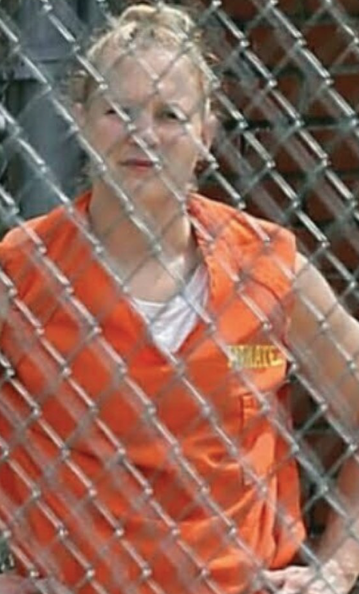Prison wardens and the federal Bureau of Prisons almost never use their compassionate release authorities, even though Congress recently made it easier for them to do so.
By John Kiriakou
Special to Consortium News
A federal judge last week denied NSA whistleblower Reality Winner’s request for release from federal prison, saying that her possible exposure to the coronavirus was not serious enough to warrant relief because she is incarcerated in a prison hospital for other health issues. The judge also said that each prison’s warden and the federal Bureau of Prisons (BOP) have jurisdiction over compassionate release. Federal judges do not.

Reality Winner. (@bjwinnerdavis, Twitter)
The problem is that prison wardens and the BOP almost never release anybody under their compassionate release authorities, even though Congress recently made it easier for them to do so. Reality Winner is not the only person, then, suffering through this pandemic, worried about sick people living practically on top of each other, and without hope of relief.
I’m in regular touch with several prisoners in the federal system and they have reported a rapidly worsening situation because of the spread of coronavirus. Not only is the disease spreading among prisoners and staff alike because of overcrowding, but poor nutrition and inadequate hygiene also play an important role.
At least 27 federal prisoners have died of coronavirus so far and untold thousands have been infected. And, although there have been some high-profile releases, like celebrity attorney Michael Avenatti and former New York Senate Majority Leader Dean Skelos, most federal prisoners who have applied for compassionate release have been told to go fly a kite.
Years of Talk
One of those prisoners, Clint Goswick, is a friend of mine. He was convicted of being a part of a methamphetamine ring and was given two decades in prison. The truth of the matter is that there were 30 people involved in his “conspiracy.” And although his role in the conspiracy was that he allowed the use of methamphetamine at his house during a party, he was given a draconian sentence because one of the attendees at the party had a gun. Clint didn’t know there was a gun. He never saw a gun. He never touched a gun. But that gun quadrupled his sentence. And because his crime is now called a “gun crime,” he is ineligible for compassionate release, whether there’s a coronavirus pandemic or not.
Now multiply Clint times thousands of other prisoners. They’re all out of luck. They have to remain in prison. I always ask myself, “Is society really better off — are we really safer as a country — keeping a guy in his mid-60s in prison for a first-time non-violent drug offense?” Our politicians like to talk about prison reform and sentencing reform, but after years of talk and even passage of legislation, we have very little to show for it. Clint will have to remain in prison for another six years. He’ll be nearly 70 years old. And that’s only if he survives the coronavirus.

Marty Gottesfeld. (Twitter)
I am also in touch with whistleblower Marty Gottesfeld. Marty is incarcerated in the notorious Communications Management Unit (CMU) at the Federal Correctional Institution at Terre Haute, Indiana. Until just a few weeks ago, Marty was held incommunicado because he had been reporting on conditions inside the prison for The Intercept, the HuffPo, and other outlets, and that reporting had embarrassed the BOP. The restrictions were lifted inexplicably and he immediately began blowing the whistle on conditions again.
Marty tells me that the BOP only locked down the prison for coronavirus on April 14. Prisoners have not been permitted to bathe since then. They are confined to their cells and are not permitted to have any outside exercise. Marty says that a nurse takes every prisoner’s temperature every few days and, if a prisoner has a fever, he is taken to solitary confinement — notto the medical unit. Solitary has a simple steel bunk, a toilet, and a sink. What it doesn’t have is a doctor or any comfort whatsoever for a sick prisoner.
Prisoners also are given one disposable mask every Wednesday morning, which they must wear at all times. For reasons not made clear to prisoners, there are new restrictions that have accompanied the lockdown. Prisoners, for example, are now allowed to spend only $50 per month in the commissary, rather than the normal $320 monthly (unless they are informants for the guards, in which case they can still spend $320.) At the same time, the commissary has no detergent, no disinfectant wipes and no hand sanitizer.
Prison authorities have also decided, in their infinite wisdom, that prisoners may only make one phone call per week. They did not explain how this is supposed to help control the coronavirus. The more likely scenario is that they hope prisoners will use their one phone call to speak with family members, rather than with journalists, who may be hungry for information from “the inside.”
No Clue
The bottom line is that the Bureau of Prisons leadership has no plan, no policy, to control the coronavirus inside its prisons. It’s winging it. If you have a fever or test positive, you go to solitary.
But how do you remain healthy when there’s no real medical care and no way to keep yourself clean? What do you do when the White House and the Congress say that many of you should be released to home confinement because of the pandemic and the warden and judges say “tough luck?”
I suppose we can write to our elected officials, but that clearly hasn’t worked. In the meantime, we can keep calling out the BOP and its wrong-headed, incompetent, and sadistic leadership. Maybe one of these days somebody will listen.
John Kiriakou is a former CIA counterterrorism officer and a former senior investigator with the Senate Foreign Relations Committee. John became the sixth whistleblower indicted by the Obama administration under the Espionage Act—a law designed to punish spies. He served 23 months in prison as a result of his attempts to oppose the Bush administration’s torture program.
The views expressed are solely those of the author and may or may not reflect those of Consortium News.
If you enjoyed this original article, please consider making a donation to Consortium News so we can bring you more stories like this one.

That literally outrageous treatment should not be be occurring in ANY nation supposedly subscribing to the rule of law and a justice system that actually imparts justice.
Why am I not surprised, then?
YES, federal BOP’s “wrong-headed, incompetent, and sadistic leadership” is responsible for Jeffrey Epstein’s suicide.
If it was a suicide????
It’s hard to take anyone seriously who calls Ms Winner a “whistle blower”.
By all means, she was railroaded and should be freed. But she is not a whistle blower, she spread, with the help of the Intercept, dubious claims about Russia and the 2016 election. She’d know this had she read the power point slides she was convicted of leaking at all well. Since those slides only guessed Russia.
Good point Jay. In her mind she was a whistleblower, but in truth she was played. Another not-so-smart victim of TDS.
That is because the Bureau of Prisons HAVE no compassion.